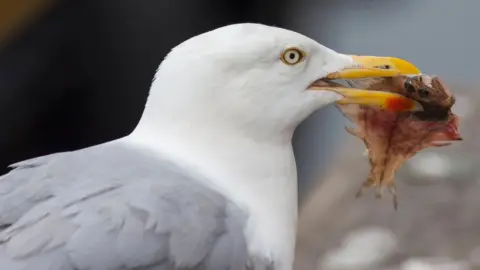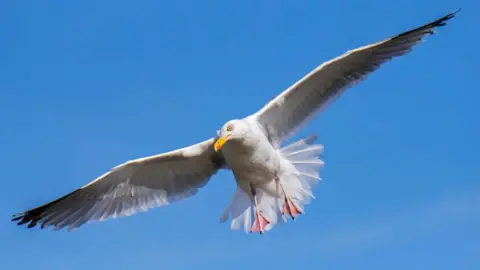Gull management discussions after child attacks
 Getty Images
Getty ImagesConservation body NatureScot has said it is happy to discuss what gull management measures can be taken in the Borders after reports of children being attacked.
Councillors were told last year that youngsters had been left with blood running down their faces in Eyemouth where the birds were "out of control".
It prompted calls for a pilot project in the town to look at ways to drive down numbers.
NatureScot said it was working with a number of areas to look at what could be done to address their issues ahead of breeding season this year.
 Getty Images
Getty ImagesIt said it was ready to work with any local authority that needed assistance with "plans or strategic approaches" to deal with gulls.
Scottish Borders Council (SBC) heard last year that seven children were attacked by herring gulls in the space of a month and left with gashes to their scalps.
Councillor James Anderson said last year that he hoped action could be taken before the end of March to tackle the situation.
"We will never have a gull-free Eyemouth - we will have a limited number of gulls in Eyemouth, smaller numbers," he said.
NatureScot said it would be willing to work with the local authority to look at what measures could help tackle the situation.
However, it stressed it needed to balance protecting bird numbers with any public health or safety risks.
"While we have not yet engaged directly with SBC, we have had discussions with local representatives and would be very happy to work with any local authority that needs assistance with plans or strategic approaches," it said in a statement.
Last year, NatureScot updated its guidance for gull licensing in response to "significant and serious" declines in populations.
That has been attributed to factors such as changes in food availability and land use, with some species also suffering losses because of recent outbreaks of avian flu.
That led to the NatureScot stressing that licensed control measures could only be used as a "last resort" when there was a risk to public health and safety.
However, it said it realised there were differing views on the birds.
"We know that gulls can sometimes cause issues in our towns and cities and that recent changes to licensing guidance to help conserve gull populations have caused concern for some people," it said a statement.
"However, the evidence is clear that gulls are struggling, and we have a duty to balance the conservation and protection of the species with public interests such as safeguarding people from health and safety risks.
"Ahead of the 2025 gull breeding season, we are working with several local authorities to look at how we can support a more coordinated approach to gull management across a number of town and city centres."
It said it had been "working closely" with Inverness, Elgin, Nairn and Aberdeen, providing advice and guidance on their gull management plans.
NatureScot said its focus would be advising on preventative measures, deterrents and guidance for local authority staff, business owners and the public.
"We also provide advice on management plans to ensure they will be effective in tackling gull issues," it said.
"While individuals can and should continue to take action to deter gulls on land and buildings within their control, a wider coordinated approach will often be more effective."
It has also been talking to East Ayrshire Council about its management strategies as it appears to have made "good progress" over the years.
